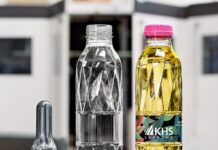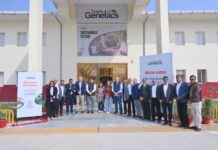
Sabic, chemicals industry, announced on 26 January 2022, a new collaboration with Ella’s Kitchen, the UK’s number one baby food brand to create a new cap made from recycled plastic. Over 3.5 million pouches of Ella’s Kitchen’s organic strawberries and apple pouches will have this new cap and will be on the shelves in UK stores from January 2022.
The recycled content for the cap is created using certified circular polymers from Sabic’s TRUCIRCLE portfolio and comes from recycled plastics from post-consumer waste that would otherwise typically be destined for incineration or landfill. Sabic’s resins are then used by Gualapack, the market leader of spouted pouches in the baby food segment and supplier to Ella’s Kitchen, to produce the cap. Ella’s Kitchen will become the first company in the baby food category to use certified circular polymers from Sabic’s TRUCIRCLE portfolio.
Abdullah Al-Otaibi, ETP and Market Solution general manager at Sabic, said, “At Sabic, we are committed to creating sustainable, innovative solutions for our customers which have been produced in a way that optimize our planet’s natural resources and create value out of post-consumer plastics. Using advanced recycling technology we produce materials for high-quality, food-grade packaging which can be upcycled over and over again. This new collaboration with Ella’s Kitchen is beneficial to the eco-system of food packaging, and is another significant step towards a circular economy for used plastics.”
The new collaboration forms part of Ella’s Kitchen’s wider packaging commitments to lower the environmental impact of its packaging and to make all of its packaging widely recyclable by 2024.
Chris Jenkins, ‘Runs The Good Stuff We Do’ (Sustainability + Corporate Communications) at Ella’s Kitchen, said, “Protecting the planet for future generations is a top priority for us at Ella’s Kitchen. That’s why we are proud to partner with Sabic to work on innovative ways how we can lower the environmental footprint of our packaging by introducing recycled content. We understand that this will not solve the recyclability question of our packaging, but hope it will demonstrate our continued commitment to creating change and the opportunity chemical recycling can play to create food contact recycled content for packaging. We hope that industry continues to focus and invest in advanced recycling to increase the availability of the material which is what is really needed to unlock lasting change.”
Stefano Manfredi, Global Sales and Marketing director at Gualapack, said, “We are delighted to be part of this innovative journey together with our customer and supplier as we have the ambition to offer the largest portfolio of sustainable solutions.”
Sabic’s TRUCIRCLE portfolio spans a range of products and services, including design for recyclability, mechanically recycled products, certified circular products from feedstock recycling of used plastic, certified renewables products from bio-based feedstock and closed-loop initiatives to recycle plastic back into high-quality applications and help prevent valuable used plastics from becoming waste.
Sabic’s certified circular polymers are produced via the advanced recycling of mixed and used plastic that could otherwise be destined for incineration or landfill. Through a process called pyrolysis, difficult-to-recycle used plastic is broken down into its chemical building blocks to produce pyrolysis oil. This is then used by Sabic’s as feedstock to create certified circular polymers which have the same properties as virgin material.
Sabic’s circular polymers are certified under the International Sustainability and Carbon Certification Plus (ISCC PLUS) scheme following a mass balance approach. This widely recognized international sustainability certification verifies that mass balance accounting follows predefined and transparent rules. In addition, it provides traceability along the supply chain, from the feedstock to the final product.
IndiFoodBev — authentic, impactful and influential
An English-language food and beverage processing and packaging industry B2B platform in print and web, IndiFoodBev is in its third year of publication. It is said that the Indian food and beverage industries represent approximately US$ 900 billion in revenues which implies more than 20% of the country’s GDP. Eliminating the wastage on the farmside can help to deliver more protein to a higher number of the population apart from generating sizable exports. The savings in soil, seeds, water, fertilizer, energy and ultimately food and nutrition could be the most immense contribution that country is poised to make to the moderation of climate change.
To improve your marketing and grow sales to the food and beverage processing and packaging industry, talk to us. Our research and consulting company IppStar [www.ippstar.org] can assess your potential and addressable markets in light of the competition. We can discuss marketing, communication, and sales strategies for market entry and growth.
Suppliers and service providers with a strategy and budget for targeted marketing can discuss using our hybrid print, web, video, and social media channels to create brand recognition linked to market relevance. Our technical writers are ready to meet you and your customers for content.
The second largest producer of fruit and vegetables in the world is continuously expanding processing capacities and delivery systems with appropriate innovative technologies. We cover product and consumer trends, nutrition, processing, research, equipment and packaging from farm to thali. Get our 2025 media kit and recalibrate your role in this dynamic market. Enhance your visibility and relevance to existing markets and turn potential customers into conversations. Ask for a sample copy of our bi-monthly in print or our weekly IndiFoodBev eZine each Wednesday.
For editorial info@ippgroup.in — for advertisement ads1@ippgroup.in and for subscriptions subscription@ippgroup.in
Naresh Khanna – 10 February 2025
Subscribe Now










